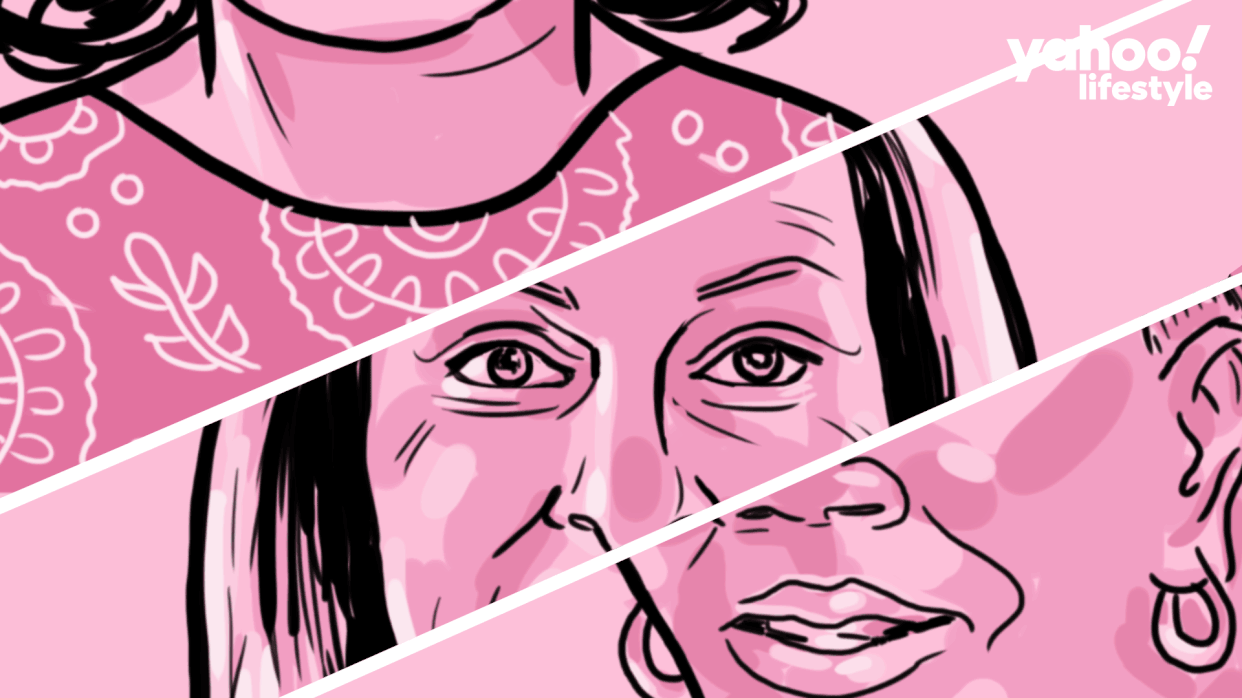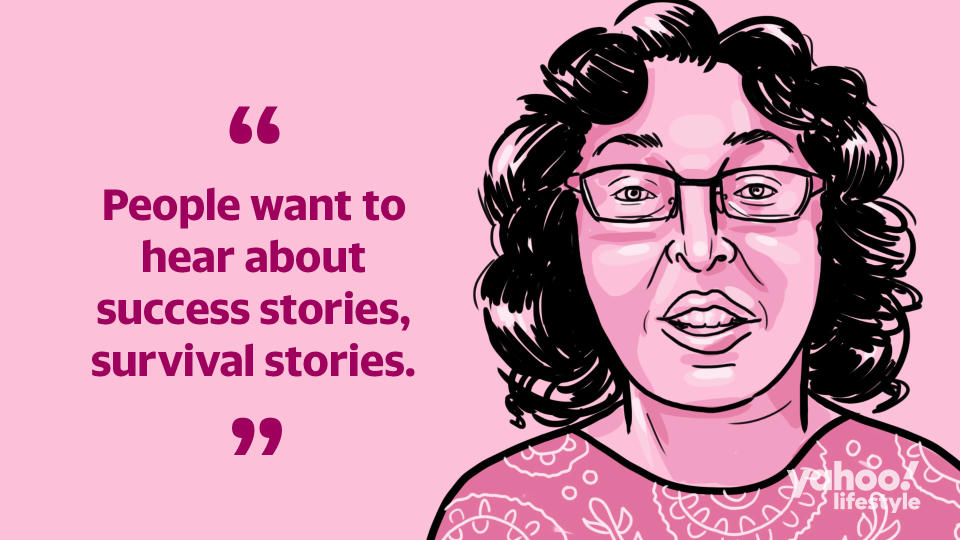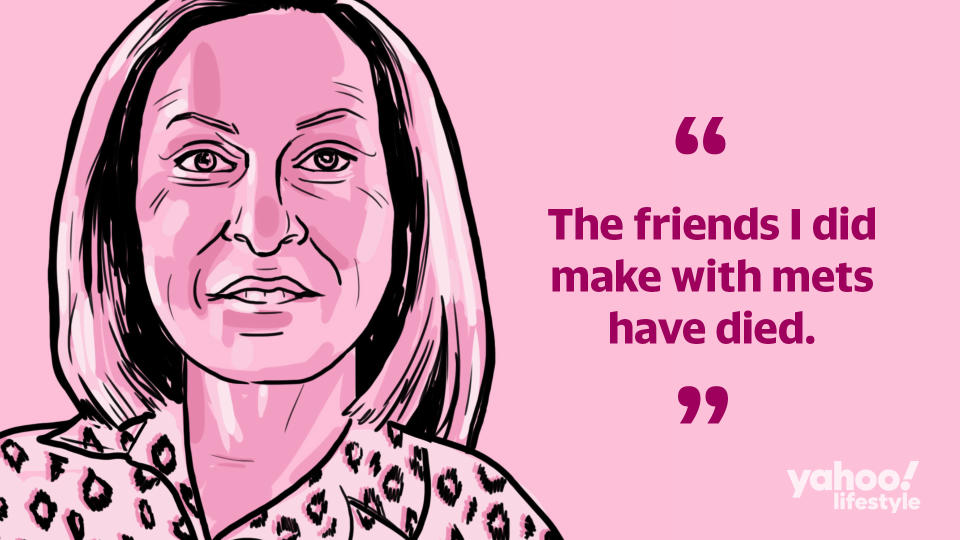The breast cancer nobody wants to talk about: 'If I don't find something that works, I will die'

As many breast cancer survivors know, there is a long-held tradition at cancer treatment centers: Each patient who completes a course of radiation or chemotherapy gets to triumphantly ring a loud bell, celebrating the end of treatment and the start of a cancer-free life.
But for those living with the fatal, stage-4 version of the disease — called metastatic breast cancer, or MBC — witnessing that event can be an excruciating reminder of something they will not get to do.
“I’ll never ring the bell,” Stephanie Walker, 60, tells Yahoo Lifestyle. Since there is no cure for MBC, only ways to manage it, she’ll be in treatment for as long as she’s alive.
It’s just one of the many ways that Walker and the estimated 155,000 women (and men) living with metastatic breast cancer in the U.S. can feel erased from the larger breast cancer narrative — something that’s especially true in October, which is Breast Cancer Awareness Month, when such positive, pink-ribbon stories of survivorship are everywhere, and mention of metastatic breast cancer is as rare as always.
“We’re their worst nightmare,” Stephanie Seban, 40, an influencer and self-dubbed “stage-4 thriver,” tells Yahoo Lifestyle about how women with early-stage breast cancer tend to view those who are metastatic. “There is such a divide in the breast cancer world.” But Seban has made it her mission to give voice to the reality of MBC.
“People want to hear about success stories, survival stories,” Katherine O’Brien, 53, tells Yahoo Lifestyle. She’s an advocate with the Metastatic Breast Cancer Network, founded for support and education in 2004, after a small group of women with MBC were asked to leave a general breast cancer conference. She’s been living with “mets,” as many call it, since 2009. “People don’t want to hear about ‘well, yes, I’m still alive, but each successive treatment brings its own challenges…’ That’s not exactly a joyful story.”
But not telling it has its own risks. “The danger there is that when nobody hears about metastatic disease [and has it], they think they’re the only ones,” says CJ (Dian) Corneliussen, who founded METAavivor, a research and support nonprofit. “And that’s true isolation.” As Walker adds, “Knowledge is power. You have to advocate for yourself.”
In honor of National Metastatic Breast Cancer Awareness Day, on Oct. 13, Yahoo Lifestyle is shining a spotlight on some of the realities of living with metastatic breast cancer — by hearing from women who have experienced isolation because of it, and have been actively engaged in trying to change that, for everyone.

“The time has come for us to show what the true face of those facing a devastating diagnosis looks like, and not lead with the celebration,” Victoria Wolodzko, senior vice president of Mission with Susan G. Komen, tells Yahoo Lifestyle. “Because the worst thing we can do is sweep metastatic breast cancer under the rug and pretend it doesn’t exist.”
What exactly is metastatic breast cancer?
MBC is breast cancer that has spread beyond the breast to other parts of the body, such as the bones, lungs, liver or brain. It’s the most advanced stage of breast cancer, also called stage-4, and is not curable, only treatable — through hormone therapy, chemotherapy, or other drugs, all of which focus on length and quality of life.
When someone has breast cancer that remains in the breast, it can be treated, and, in the majority of cases, never reappear. But an estimated 20 to 30 percent of people initially diagnosed with early-stage disease will see the cancer recur, or become metastasized, sometimes up to 15 years later; only about five percent of people with MBC will be metastatic at initial diagnosis.
While being diagnosed with metastatic breast cancer is not an instant death sentence, most will ultimately die of the disease; it accounts for approximately 40,000 deaths a year in the U.S. It can affect men and women, both old and young.
Dealing with the weight of having a terminal disease is the hardest part, say the women who spoke with Yahoo Lifestyle. “But it’s changed a lot,” says Corneliussen, 68, who has lived with the disease for an unusually long 13 years. “Initially, it was just constantly in my head — always a reminder that there’d be something I’d never be able to do. I was very frightened and afraid to go to sleep at night. That was horrible. After a year or two, I started getting accustomed to it. But even then, it was still there, just hidden behind a façade.”

Adds Teri Pollastro, 59, a Seattle mother of two who has lived with MBC for an even rarer 16 years, “Emotionally, mentally, psychically, it’s just a lot of work. It can be exhausting and overwhelming, and I find I need more time to be quiet and process.”
Still, she adds, “I think it has gotten better. When I was first diagnosed I was already in a support group, but I didn’t feel comfortable anymore, because they were busy living their lives and I was busy dying. The friends I did make with mets have died. It was so isolating and so lonely.”
Invisibility, perpetuated
As a recent example of how the fact of MBC is so often erased, O’Brien points to the September death of pioneering journalist Cokie Roberts — whose official cause of death was reported as “complications from breast cancer.”
Similarly, when actress Diahann Carroll died on Oct. 4, the cause was reported as “cancer,” with some stories simply stating that she passed away “following a battle with breast cancer.” Never once (at least in this writer’s search) was “metastatic” mentioned.
And that omission, whatever the reason, can feel troubling to many, as O’Brien wrote after Roberts’ death in a LinkedIn article on Sept. 17, “When I read she died ‘due to complications of breast cancer,’ I couldn't help but wish that the statement was more specific — she died from metastatic breast cancer. For most people, that's probably not an important distinction. But for me… it is.
“When someone dies from breast cancer, they die from metastatic disease. No one dies from early-stage breast cancer.”

O’Brien says she’s appreciative anytime there’s a public mention of MBC. “Elizabeth Edwards had metastatic breast cancer. She was very straightforward about it,” she recalls. “But her husband was campaigning, so it was going to be obvious that she was in treatment.” It’s hard to say what might stop a well-known person from explaining publicly about being metastatic, O’Brien says, but she imagines that when you’re a successful woman who wants to keep working through treatment, “there’s going to be a perception that if you have stage-4 cancer, you can’t.”
Recalling a time, nearly a decade ago, when the Susan G. Komen nonprofit ran an ad in Prevention magazine featuring a young woman with MBC, she says, “We cried, because those stories weren’t told. Today there’s a little bit more recognition. Now you can’t turn on your TV without seeing an ad for [the MBC drug] Ibrance. But they still don’t really explain that there’s going to be a finite amount of time that it works. Because ultimately, they all fail.”
Pollastro, whose metastatic disease was diagnosed in 2003, years after her initial early-stage diagnosis and mastectomy, adds that she has noticed a slow change regarding discussion of MBC, noting, “Forty years ago, no one was even saying the words ‘breast cancer.’”
Day-to-day realities
Walker, who, like O’Brien, was diagnosed as metastatic from the start, lives in a “medically underserved” rural area of North Carolina, with a population that is largely African-American, like herself. She has opted to travel to Duke University Hospital for her treatments, which is one hour and 45 minutes, or 100 miles door-to-door. “I go every 28 days if everything is going well. This month I have six appointments at Duke,” she says.
A former nurse who was forced to retire not long after her diagnosis, Walker has been through a bevy of treatments, all of which came with their own challenges, from extreme neuropathy (numbness) in her hands, feet and legs, to bone pain, muscle aches, headaches, confusion and even a blood clot on her lung. After she stopped working she had to endure a six-month waiting period for permanent disability, and her retired husband went back to work. The weight of it all has sent her into therapy.
Pollastro, meanwhile, spent 2003 to 2010 in constant treatment. She took a break when doctors could find no evidence of disease, but it reappeared after five years, in her liver, sending her in for more chemo, followed by a booster of a vaccine trial that she’d been a part of years earlier.
Seban, who shares about her incredible journey on Instagram, through MBC-themed accessory designs, by co-authoring a book called The Thrivers Guide, and even through a recent campaign with Rihanna’s Savage x Fenty brand, was diagnosed with MBC nine years ago, at the age of 31. She was given a five-year life expectancy, and has since endured constant chemotherapy, frequent injections, induced menopause, five surgeries, the loss of a breast, collapsed lungs, and “two near-death experiences.” Her treatments are ongoing.
Says O’Brien, “When you have metastatic disease, you don’t finish treatment. I didn’t understand that at first… But every few months you have a PET-CT and bone scan to determine if your treatment is still working. Ultimately, it will stop working, and then you have to move on to a different drug.” For her, that’s meant a long series of oral drugs that have all become ineffective, as she’s watched the cancer spread first to her bones and then to her liver.
“I have come to the end of any oral drug, so now it’s IV chemo,” O’Brien says. “If you have early-stage, you’d maybe have six cycles of chemo. But I will be on this chemotherapy as long as it’s still working… If I don’t find something that works, I will die.”
Dealing with judgment
This no-end-in-sight cycle of treatment is something that many MBC patients say can make them feel like “failures” within the larger context of breast cancer “survivors.”
Says Pollastro, “Sometimes people tell me, ‘I beat it and you need to do this or that… it drives me crazy.”
Walker adds, “I lost a really good friend because of her judgment. She reminded me how I had said years earlier that I would never ‘put poison in my body.’ She said, ‘You told me you would never do that.’ I said, ‘Don’t be negative.’”
One 43-year-old woman (requesting anonymity), tells Yahoo Lifestyle she opted to treat her early, stage-0 diagnosis with natural remedies, only to find it metastasize. “I feel wary of speaking about my choices because people either feel I was an idiot to try natural or a sellout to use medical approaches,” she says. “Metastatic disease terrifies survivors of stages 0 to 3, and the way I can be living a normal life is usually not understood… I choose to only share my process with a few people. ‘Stage 4’ is still heard as ‘practically dead,’ which isn't always the case.”
Finding support and hope — especially in outliers
The No. 1 support factor for women with MBC, at least the one cited by those who spoke with Yahoo Lifestyle, is finding other women who are metastatic.
“The thing I wanted to do was to meet people in a similar situation and find out what drugs are they on, how they tell people, what their families think,” Corneliussen recalls from when she formed her first support group over a decade ago. Maintaining such connections has continued to hold a vital place. “When a person has metastatic cancer, they’re going from treatment to treatment — it goes on and on — and your life kind of revolves around medical visits, seeing what’s going on in the research world. If you don’t let them talk about it and they walk off, now they’ve got no friends. That’s another form of isolation. I’ve learned to stay away from the topic when I’m with people who aren’t metastatic.”
O’Brien notes that the task of finding others has changed radically since 2009, when she was diagnosed. “Social media was not what it is today. It was really hard to find other patients,” she says. “Now it’s easier.”
She (and many of the others) wants to make it clear that she is “an outlier,” who has lived well beyond the norm, not wanting to provide any false hope for the newly diagnosed. Pollastro agrees, noting, “I like people to know that I am not the norm. I was playing tennis earlier today. So, most women with metastatic don’t look like me. There’s definitely some survivor guilt.”
But then there’s Seban, who focuses on such positive stories, rare or not.
“I’m not oblivious, but I do look for the outliers, personally, to give me hope, and also to give others hope,” she says, adding that, “One million percent, more people need to understand what metastatic disease is,” and especially spread the news that, like herself, “you can be metastatic and you can look quote, unquote, ‘normal.’
But, she adds, “I believe in always looking to the positive because I believe your mental state affects your physical state. That’s what keeps me going.”
Read more from Yahoo Lifestyle:
What to say — and not to say — when a friend tells you, ‘I have breast cancer’
Why some breast cancer survivors are getting their implants removed
Want daily pop culture news delivered to your inbox? Sign up here for Yahoo Entertainment & Lifestyle’s newsletter.


